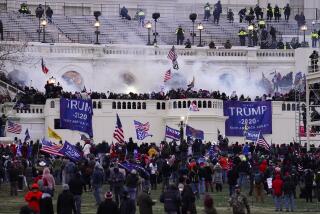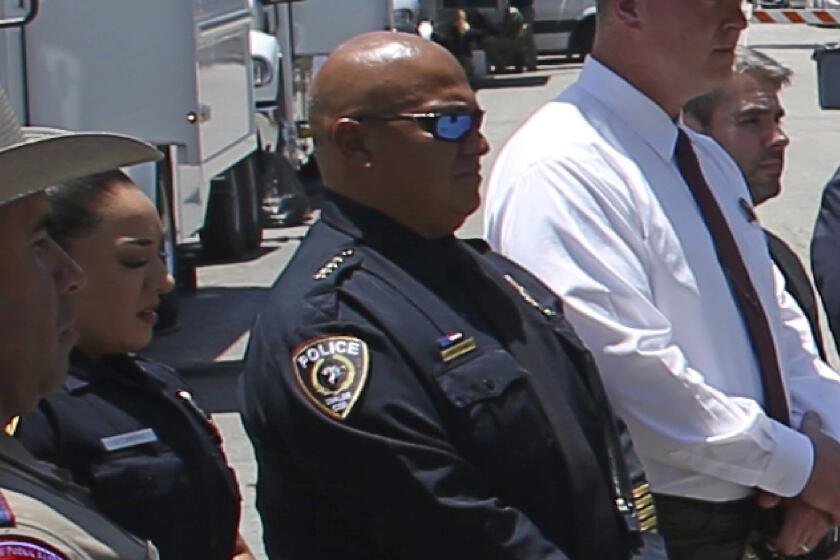Millions Vanish From West Virginia Bank
No one stopped to watch as workers dismantled the only bank in this southern West Virginia coal town, one box at a time. There is no more shock at the collapse of an institution that once boasted the motto, “Time Tried, Panic Tested.”
Hour after hour, movers loaded 7,000 boxes of documents onto trucks headed for Dallas. Federal regulators there hope to discover how $515 million vanished from a prosperous bank in an Appalachian county where 37% of the residents live in poverty.
Even before Sept. 1, when the U.S. Office of the Comptroller of the Currency closed the First National Bank of Keystone amid allegations of “apparent fraud,” rumors of trouble swirled through this town of 627, prompting a run on the bank.
The 95-year-old community bank, which anchored Main Street and advertised assets of $1.1 billion, still has its supporters along the winding two-lane highway that connects small towns in a rugged valley.
“We thought they were just as solid as anything and still don’t know that it’s not,” said Becky Barker, an employee at the Kimball Light and Water Co. in nearby Kimball.
Federal investigators may disagree.
At the top of a mountain reached by a dirt road rutted by coal trucks, investigators have recovered 370 boxes of bank records that had been buried in a 100-foot-long trench on property belonging to Terry Church, the bank’s senior executive vice president.
A federal magistrate ruled last week there is sufficient evidence that Church, 46, and Michael Graham, 49, who performed accounting work at the bank, interfered with a federal investigation by burying three truckloads of bank records.
Prosecutors have 30 days to seek indictments against the two, who have refused to comment.
The federal comptroller’s office said it closed the bank after a three-month investigation found that $515 million in loans--nearly half the bank’s assets--were sold yet remained on the bank’s books as assets.
First National’s failure could ultimately cost the Federal Deposit Insurance Corp. even more as the agency tries to cover another $200 million in missing assets and administrative expenses. The recovery may place First National among the 10 costliest bank failures in the nation since the mid-1980s, said David Barr, a spokesman for the FDIC in Washington.
A civil suit filed in McDowell County Circuit Court on Oct. 21 contends that hundreds of local depositors lost as much as $15 million. Bank customers who deposited more than the amount protected by the FDIC--$100,000 for each account--want bank officers to reimburse them for their uninsured losses.
The federal probe will likely focus on the bank’s practice of paying high interest rates to attract capital from throughout the United States and selling mortgage loans to pools of investors who put up additional money. The practice is not uncommon, but federal regulators are examining the bank’s aggressive marketing of federally backed mortgages.
J. Knox McConnell, a Pittsburgh banker who took over First National in 1977, used the Internet to advertise beyond southwest McDowell County to draw deposits through high interest rates.
McConnell’s strategy worked, boosting assets from $17 million to more than $1 billion in 20 years. An industry publication, American Banker, once referred to his bank as the most profitable community bank in the nation.
McConnell died of a heart attack in 1997 at age 69.
Officials at Ameribank Inc., which assumed Keystone’s operations and $135 million in locally held deposits after the closing, said they will be more traditional in their banking style.
McConnell’s banking methods were a “very sophisticated kind of financing that requires Wall Street,” said Ameribank chairman Jim Sutton. “We’re country bankers. We don’t have that kind of sophistication.”
First National’s failure has created a $465,000 hole in Keystone’s municipal budget, forcing officials to lay off six of 15 employees. The bank’s loss also has taken $200,000 out of McDowell County’s annual $2.9-million budget, officials said.
Katherine Young, a manager of a medical equipment business in Northfork, said she fears ripple effects if Keystone bank’s failure takes down its top two officers.
“It’s like the town is going to be a ghost town,” she said.
Keystone Mayor Billie Cherry, a longtime friend of McConnell and chairwoman of First National’s board of directors, said she will continue to fight.
“We’re not finished,” Cherry said. “I don’t know what I can do. I can’t give up, though.”
More to Read
Start your day right
Sign up for Essential California for news, features and recommendations from the L.A. Times and beyond in your inbox six days a week.
You may occasionally receive promotional content from the Los Angeles Times.






